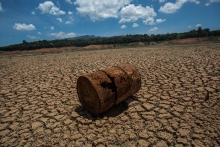São Paulo to run out of water within two months

Behind this chaos is the de facto privatization of Sabesp, a public company which still holds the concession of public water and sanitation services despite becoming, in 1996, a mixed capital company, trading its shares on the São Paulo and New York stock exchanges - a move that led the company to become focused on profit to shareholders. 49.8% of Sabesp’s shares are held privately, the rest held by the State of São Paulo.
The situation in the city is so drastic that the mainstream media and the São Paulo Governor, Geraldo Alckmin, are now trying to blame nature - lack of rain - and consumers instead of pointing to the main reason for this unprecedented calamity: the lack of investments over a period of 20 years in favour of incessant greed from “investors” who were awarded, for example, from 2003 to 2013, 60% of Sabesp's profits in dividends.
The lack of water has already been felt in some other cities of the state of São Paulo, since Sabesp (which in Portuguese stands for Basic Water and Sanitation Company of the State of São Paulo) operates the water supply and sewage collection in 364 out of São Paulo's 645 cities, reaching a total of 28,2 million people. Sabesp’s ambition is to operate all of the utilities in the state – through revolving 30-year concession contracts. It is also seeking to expand internationally, and has signed cooperation agreements with Spain, Israel and Costa Rica.
Governor Alckmin promised during last year's elections “no matter what, São Paulo wouldn't run out of water in 2015”. For the first time, reluctantly, he has used the expression “water rationing” – if only to justify the additional charges he intends to apply.
It is clear that behind his fear of political damage lies his apprehension that such a speech will make Sabesp's profits tumble.
The governor is blaming the long drought on deforestation and climate change – which is a reality all over the world – instead of blaming the lack of investment in increasing water collection and improving existing infrastructure.
At the time of writing , the Cantareira – a water supply system composed of five interconnected reservoirs that provide water to 6,2 million people in the metropolitan region of São Paulo city– was working at only 5.4% of its capacity and decreasing on average by 0.1% a day, which means that the system could dry out completely within 60 days.
To illustrate how fast it is drying up: the level of Cantareira fell from 7.2% to 5.8% of its capacity between the 1st and 19th January despite the fact that water consumption is now already 25% lower than it would be if there were no water crisis.
Another important point, rarely emphasized, is that Sabesp, despite being considered worldwide as an efficient company, wastes 36% of treated water due to pipe leakages. Of the remaining water, 70% of it is consumed by agribusiness plantations, 22% by industry and a mere 8% is destined to domestic use.
Sabesp's president, Jerson Kelman, admits that in order to permanently solve all leakages, the old pipes need to be replaced – a difficult task as there are about 64,000 km of pipes buried in the metropolitan area.
Outsourcing
Sabesp has also been affected over the last 20 years by its growing dependence on outsourcing to private companies. In 2004, the company employed 18 thousand workers and its operating base was smaller. Now, the company employs less than 14 thousand workers and serves many more people.
Loss of water increases with outsourcing usually because of poor service. The repairs are of poor quality, needing to be renewed repeatedly thereby increasing water loss. As well, outsourcing key services can block management’s attempts to modernise and improve, as the outsourced companies do not participate in the overall long-term planning, and the contracts lock in a specific type of service delivery.
Unfulfilled promises
Finally, it must be pointed out that such a situation is not new. In 2003, the water supply system nearly collapsed as the Cantareira system also came close to zero, with less than 5% of its storage capacity.
At the time, a plan was devised for the water system of São Paulo to become less dependent on the Cantareira. The idea was to reduce losses, increase reuse and find new ways to supply water by using other sources – but none of these measures were taken.
Despite the fact that Sabesp's majority shareholder is the government of the State of São Paulo, controlling 50.3% of shares, this has not been sufficient to drive the company's interests towards the benefit of the population or the workers.
Protest
To protest this massive mismanagement, Public Services International (PSI) with FNU, other trade unions and social movements are calling for a massive demonstration on 20 March prior to World Water Day on 22 March.
by Jocelio Drummond and Marcelo Netto

